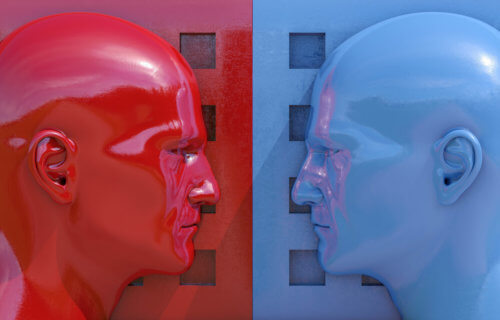ROCHESTER, N.Y. — The battle between Republicans and Democrats typically gets most of the blame for anything that goes wrong in American society today. Although politics may be more polarizing than ever before, a new study finds when the two major parties are in close competition with each other, the American people benefit the most.
Researchers Gerald Gamm, from the University of Rochester, and Thad Kousser of UC San Diego say states that see tight competition between Democrats and Republicans for political control often end up passing measures which improve the quality of life for the people living there. Their study looked at the history of the two-party system from 1880 to 2010 and discovered two main trends.
The first is that there appears to be a link between party competition and increased spending on human capital and infrastructure. The second is that this spending often leads to improvements in the public’s welfare. These links include the political balance in Congress, state legislatures, urban politics, and modern party politics.
“Competition between parties is not just healthy for a political system but for the life prospects of the population,” says Gamm in a university release.
Living in a ‘red state’ or ‘blue state’ is bad for your health
For staunch Democrats, liberals, Republicans, and conservatives, living in a deep “blue” or “red” state may seem better for their well-being — and lead to less arguments too! However, the study finds states where one party typically has overwhelming control (such as New York, California, or Texas) actually do a worse job of providing a good life for its residents.
Researchers say residents in deep blue or red states have a lower life expectancy, lower levels of education, and less income in comparison to so-called “swing states.” Heavy Democrat and Republican states also saw a higher rate of infant mortality throughout the years.
“We find that states that spend more—and spend more because of party competition—become places where children are more likely to survive infancy, where they learn to read and where they graduate from high school, where adults live longer lives, and, at least in the pre-New Deal era, where people earn higher incomes,” says Kousser.
One-party rule leads to poor policies
So, what’s causing this downturn in social well-being in certain states? The study finds that when one party holds too much power and holds it for too long, politicians end up pushing through more “pork-barrel” projects which only benefit a small number of residents in an area.
Conversely, when the two parties regularly battle for control, those in power find ways to improve the reputation of their party by pursuing statewide programs that help many people. Researchers add that both Democrats and Republicans get the chance to show the public how they differ from their political opponents.
“Party competition creates bonds between copartisans from across the state and between the executive and legislative branches, leading both parties to work for programs that benefit a broad set of constituents,” the team says.
Is modern political polarization changing this?
“In the contemporary environment, we recognize that the historic importance of party competition may be attenuated, negated, or even reversed,” the team writes.
Gamm notes that in the past, voters and elites likely agreed on many political policies. Now, however, the researcher says politics is becoming a “zero-sum game,” with both parties completely opposed to the other’s philosophy. With that in mind, the team says it’s hard to know if this trend will continue in the post-2010 era of politics.
“What we show here, drawing on a full century of data on party competition and spending, as well as data on health, literacy, and prosperity through 2010, is the central importance of two-party competition to the rise of the American state and the flourishing of the American people,” the study authors conclude.
The study is published in the journal American Political Science Review.
